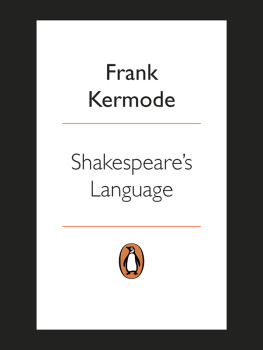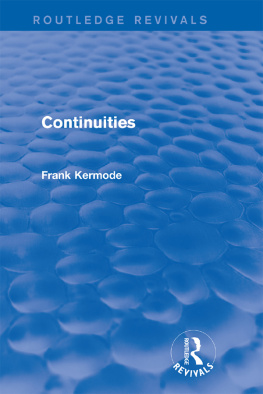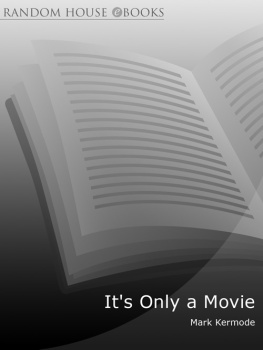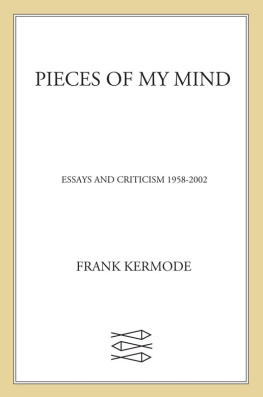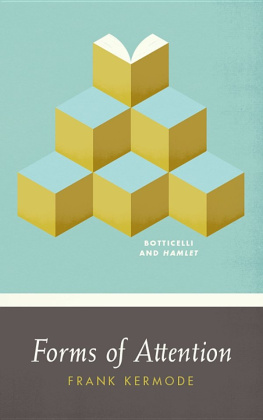Contents
Frank Kermode
SHAKESPEARES LANGUAGE
ABOUT THE AUTHOR
Frank Kermode was born in 1919 and educated at Douglas High School and Liverpool University. From 1974 to 1982 he was King Edward VII Professor of English Literature at Cambridge University. He is an Honorary Fellow of Kings College, Cambridge, and holds honorary doctorates from Chicago, Liverpool, Newcastle, Yale, Wesleyan, Sewanee and Amsterdam universities. He is a Fellow of the British Academy and of the Royal Society of Literature, an Honorary Member of the American Academy of Arts and Sciences and of the American Academy of Arts and Letters, and an Officier de lOrdre des Arts et des Sciences. He was knighted in 1991. Professor Kermodes publications include Romantic Image, The Sense of an Ending, Puzzles and Epiphanies, Continuities, Shakespeare, Spenser, Donne, The Classic, The Genesis of Secrecy, Essays on Fiction 197182, Forms of Attention, History and Value, An Appetite for Poetry, The Uses of Error, Shakespeares Language (Penguin, 2000), Pleasing Myself (Penguin, 2001) and an autobiography, Not Entitled. He has also edited He Knew He was Right and The Way We Live Now by Anthony Trollope, and The Figure in the Carpet and Other Stories by Henry James for Penguin Classics.
TO URSULA OWEN
AND ANTHONY HOLDEN
PENGUIN BOOKS
SHAKESPEARES LANGUAGE
A quite brilliant book Shakespeares Language is the fruit of much study and of even more individual thought and feeling. In a better world there would be queues for it outside the bookshops and its author would be offered a seat in the House of Lords Robert Nye, Scotsman
An inspiring work Tom Paulin, Observer, Books of the Year
A beautiful and valuable book in the great tradition of Coleridge and Empson Sir Frank Kermode now occupies a position once held by Sir William Empson as the acutest interpreter of linguistic complications in the great scenes of Shakespeare Declan Kiberd, Irish Times
A magnificent book, the honey of a lifetimes visits to the Shakespearean garden What a pleasure it is to read a critic so learned, so rammed with scholarship, who at the same time endeavours to read Shakespeare as a writer, fallible like any other James Wood, Guardian
Frank Kermode is undoubtedly the greatest literary scholar of his generation The book is full of marvels dripping with unostentatious scholarship Colin MacCabe, Independent
Refreshing and informative, profoundly studious and at the same time bearing the happy mark of Professor Kermodes accessible style Muriel Spark, Sunday Telegraph, Books of the Year
Such a scholarly book that it made me wish I had sat at the feet of its author and studied English with him Joan Bakewell, New Statesman, Books of the Year
A stunning book that both critic and layman will enjoy Katie Donovan, Irish Times
Kermode scrutinizes the poetry with an authority you would expect and with a vivacity and passion which is exhilarating Melvyn Bragg, Independent, Books of the Year
Hamlet is literatures greatest bazaar, says Kermode. It is a wonderful image, and appropriate to this book, through which one can wander at will, picking up this and that, brushing shoulders with strangers and friends, ones attention drawn both to unexpected treasures and to familiar joys, dazzled by the vigour and the life on show Richard Eyre, Literary Review
Elegantly re-assert[s] the essential place of the Pleasure Principle, in reading as in writing, something most recent academic criticism has lost sight of A. S. Byatt, Independent, Books of the Year
A rich and stimulating discussion of how the Bard evolved from a dramatic poet into a dramatist blazing with insight and erudition Elizabeth Buchan, Daily Telegraph
Preface
This book is addressed to a non-professional audience with an interest in Shakespeare that has not, I believe, been well served by modern critics, who on the whole seem to have little time for his language; they tend to talk past it in technicalities or down to it in arcanely expressed platitudes. Every other aspect of Shakespeare is studied almost to death, but the fact that he was a poet has somehow dropped out of consideration. Of course I do not mean that all modern writing on Shakespeare is rubbish; there has been plenty of high-class scholarship, here for the most part ignored. Anybody who wants to know in detail about the life of Shakespeare, the construction, location, and personnel of Elizabethan theatres, or contemporary methods of acting, will need more specialized studies. I have confined my attention as far as possible to my stated subject, without offering yet another general introduction to the plays.
My concern is for the most part with Shakespeares dramatic verse. He was an accomplished non-dramatic poet, but his eminence depends on his work for the theatre and is emphasized by what has long been accepted as his superiority to the other dramatic poets of the time, though among them were theatre poets of high distinction, such as Marlowe, Middleton, Webster, and Jonson.
Such laudatory estimates are commonplace, and can be dismissed as hollow echoes of an obsolete and detested idolatry. But whatever else this book may be, it is not idolatrous; it shuns that ancient error as coldly as it avoids its modern counterparts. There are modern attitudes to Shakespeare I particularly dislike: the worst of them maintains that the reputation of Shakespeare is fraudulent, the result of an eighteenth-century nationalist or imperialist plot. A related notion, almost equally presumptuous, is that to make sense of Shakespeare we need first to see the plays as involved in the political discourse of his day to a degree that has only now become intelligible. These and other ways of taking Shakespeare down a peg seem, when you examine them, to be interesting only as evidence of a recurring need to find something different to say, and to say it on topics that happen to interest the writer more than Shakespeares words, which are, as I say, only rarely invoked. The tone of these novelties is remarkably self-confident. The critics need to value their own opinion above that of many predecessors whose qualifications they might not in general wish to dispute. They have to treat as victims of imperialistic brainwashing Johnson, Keats, and Coleridge, to name only three. Of course if you can rubbish Shakespeare you can also rubbish these and comparable authorities; respect for them is merely another instance of our acceptance of unexamined bourgeois valuations. But in the end you cant get rid of Shakespeare without abolishing the very notion of literature.
On the other hand, the various forms of idolatry against which doctrines of this sort are over-reactions must also be deplored. There is no reason why we should not find passages and even plays that are routine and relatively uninteresting; a man who wrote so much, and sometimes in a hurry, might well, to borrow a phrase of Drydens, have some flats among his elevations. In short, this book is by one who believes in the greatness of Shakespeare without what Dr. Johnson called superstitious veneration, always remaining on this side idolatry, like Ben Jonson.

